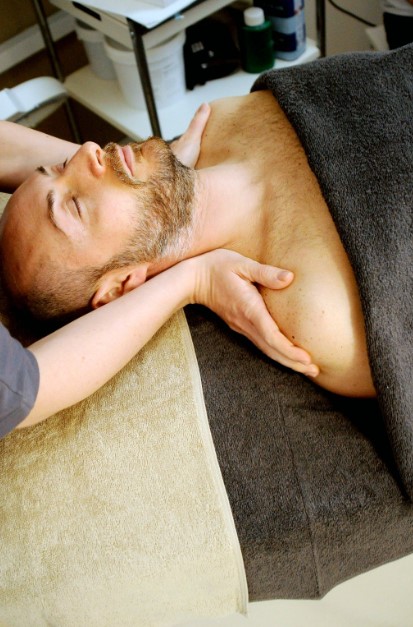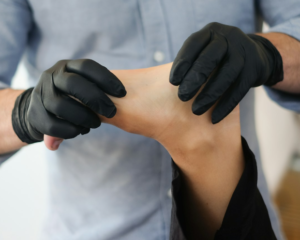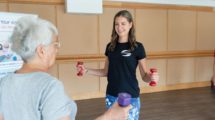Occupational physical therapy (OT) is a specialized field of healthcare that focuses on helping individuals with physical, mental, or developmental disabilities live their daily lives to the fullest. It helps individuals perform tasks and activities that are essential for their everyday living, such as self-care, work, leisure, and social participation. In this blog, we will explore how occupational physical therapy can enhance daily living and improve the overall well-being of individuals.

Introduction to Occupational Physical Therapy
Occupational physical therapy (OT) is a type of healthcare that focuses on helping individuals with disabilities or limitations to live their daily lives to the fullest. It aims to improve an individual’s ability to perform tasks and activities that are essential for their everyday living, such as self-care, work, leisure, and social participation. No matter if you choose therapists from therapy partners or work with an OT independently, the ultimate goal is to improve overall well-being and quality of life for those in need. With a holistic approach, occupational physical therapy addresses physical, mental, emotional, and social aspects of disability to help individuals achieve their maximum potential and independence. It works hand in hand with other healthcare professionals and caregivers to provide comprehensive care and support for individuals with disabilities.
The Role of Occupational Physical Therapy in Daily Living
The role of occupational physical therapy in daily living is crucial. It helps individuals with disabilities regain or improve their ability to perform tasks and activities that are essential for daily living. These may include basic self-care tasks like dressing, grooming, and bathing, as well as more complex activities such as working and participating in social events. Occupational physical therapists work closely with their patients to develop personalized treatment plans that address their specific needs and goals. They use various techniques, exercises, and assistive devices to help individuals improve their motor skills, coordination, balance, strength, and endurance. These interventions not only enhance daily living but also promote independence and self-confidence in individuals with disabilities.
Enhancing Self-Care through Occupational Physical Therapy
Occupational physical therapy plays a significant role in enhancing self-care for individuals with disabilities. These are essential activities that we do every day, such as dressing, bathing, and grooming. For individuals with physical limitations, these tasks can become challenging or even impossible to perform without assistance. Occupational therapists work with their patients to develop strategies and use assistive devices that can help them perform these tasks independently. For example, an OT may teach a patient how to use adaptive equipment like buttonhooks or reachers to dress themselves. They may also work on improving their patient’s motor skills and coordination to make self-care tasks easier and less frustrating.

Improving Work Performance with Occupational Physical Therapy
For individuals with disabilities, finding and maintaining employment can be challenging. Occupational physical therapy can play a significant role in improving work performance for these individuals. OTs can assess an individual’s functional abilities and design workplace modifications or accommodations to help them perform their job tasks more efficiently. They may also provide training on proper body mechanics and posture to prevent work-related injuries. Moreover, occupational therapists can collaborate with employers to create a more inclusive work environment and educate coworkers about the needs of individuals with disabilities.
Promoting Engagement in Leisure Activities through Occupational Physical Therapy
Participating in leisure activities is essential for our mental and emotional well-being. However, individuals with disabilities may face barriers that prevent them from enjoying these activities fully. Occupational physical therapy can help address these barriers and promote engagement in leisure activities. OTs can teach their patients how to use adaptive equipment or techniques to participate in leisure activities they enjoy. They can also design customized leisure programs that cater to the individual’s interests and abilities. events.
Social Participation and Community Integration with the Help of Occupational Physical Therapy
Social isolation is a common issue faced by those with disabilities, which can lead to feelings of loneliness and depression. Occupational therapists work with their patients to develop social skills and confidence that are necessary to interact with others. They may also provide support and guidance on how to navigate social situations and build meaningful relationships. Furthermore, occupational physical therapy can help individuals with disabilities become more involved in their communities by providing access to resources, services, and activities that promote inclusion and integration. Through these efforts, individuals with disabilities can lead fulfilling and independent lives as active members of society.
Occupational physical therapy plays a crucial role in enhancing daily living for individuals with disabilities. With the help of occupational physical therapy, individuals with disabilities can live their daily lives to the fullest and improve their overall well-being. So if you or a loved one is facing challenges due to a disability, consider working with an occupational physical therapist to improve daily living and achieve a better quality of life.






